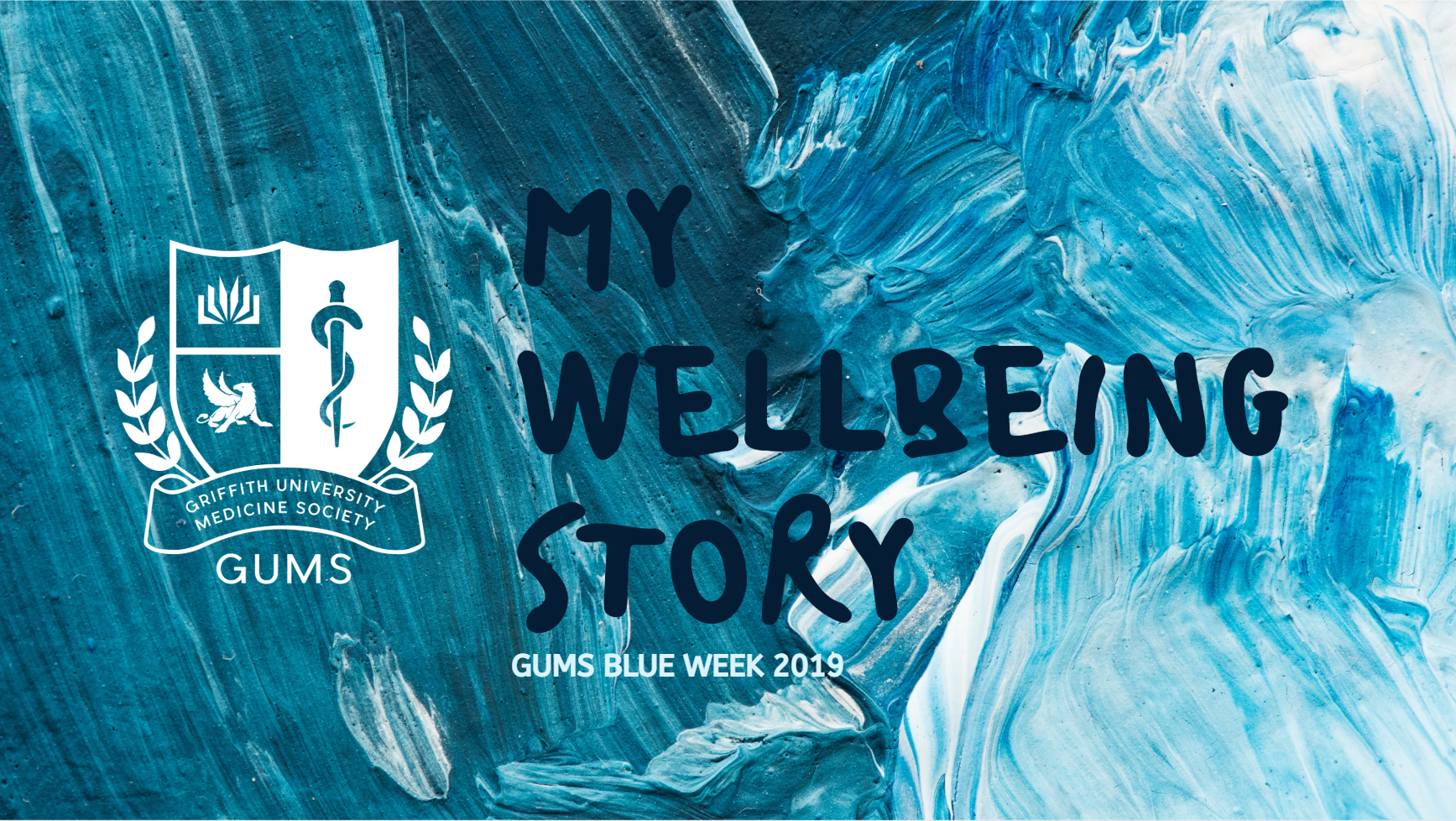
23 Jul My Wellbeing Story: YEAR 1
This Blue Week, we asked people at different stages in their medical career to share their personal Wellbeing Stories unique to the current context of their medical careers. Through various stages of medicine, we all face our own unique challenges and although it may sometimes feel like we are all alone or the only one struggling, this is often the furthest thing from the truth. Each of us has a Wellbeing Story that describes the challenges we face and how we approach them. Sharing these stories creates a community that is positive, understanding and supportive as we work together to create a healthier environment for health professionals. As you navigate your own challenges, we hope these stories encourage you and empower you to talk and share with others.
If you, or someone you know, needs help please contact:
- Lifeline
- 13 11 14
- Beyondblue
- 1300 22 4636
- Eve De Silva (Griffith University School of Medicine)
Year 1
First year is a daunting year, one filled with difficult transitions and, often, weighty personal expectations. Here are some stories from first year students.
Story 1
I struggled to adapt to the style of teaching in medicine. Compared to undergraduate courses, medicine definitely places more emphasis on learning independently. As such, finding the right pace was, and still is, a challenge. While I anticipated an increase in workload, the amount of self-directed learning came as quite a surprise. I spent a copious amount of time perfecting each LO, which came at the expense of my diet and sleep. I started to skip meals and couldn’t sleep as well as I used to. I found that my support systems helped me to break free from these negative behaviours. I talked to my friends, both studying medicine and those outside of the area, as well as family members. I also found that self-reflection helped me to gain important insights into what I could do differently. Overall, this challenge has helped me transition from the traditional spoon-feeding method of learning I was used to, to a more self-sufficient process.
Story 2
After 2 years away from university, I found it quite difficult studying again. I couldn’t rely on the study habits that I used in my undergraduate degree as medicine was a completely different ball game. I was used to having subjects that were independent of each other, but medicine involved a more integrated style of learning. I knew that it would be difficult to find a method of studying that was efficient for me, but I did not think it would take as long as it did. It was only towards the end of ISM when I finally found a method of study that worked for me. So how did I finally find my way? The first step was realising that I had an ineffective study method, which I noticed quite early on as I could not retain the information that I presented in PBL. I formed a study group, with a group of friends that live closeby to me. Having them there encourages me to study, not to mention, being out of my room decreases my tendency to procrastinate! Studying with them also meant that we could quiz each other, question/clarify things and teach each other as well. I am glad it took me a while to find an effective study method because I am wiser through my experiences and have a solid way forward into the Systems block.
Story 3
I always knew that this program would be academically challenging, but I did not expect the emotional challenges that I faced in the first 6 months of this year. I felt like I was always trying to play catch up with all the information that we had to know. I also struggled with “imposter syndrome” significantly. Being surrounded by so many brilliant students changes how you see yourself. These challenges were unexpected, and that was the most shocking part for me. I felt very lethargic, unmotivated and overwhelmingly fatigued. I started to lash out to those closest to me. I would then retreat to being alone, which only exacerbated my feelings of fatigue. Fortunately, those around me pointed out the shift in my behaviour. I then began to take one night or afternoon to myself. I would binge watch a show on Netflix and cook some food (I really love to cook). I quickly realized how even a couple hours every other day really changes how you feel about tackling the challenges in medical school. I also incorporated mindfulness into my daily life- it really helps to ground me and ensures that I am focused on the task at hand. These small changes in my life have made a huge impact on how I feel about getting through this program. By making time for myself and especially my own mental health, I am able to better tackle the long hours and intense schedule of medical school. Dare I say, I am enjoying it more!
Story 4
A key struggle I’ve experienced is adjusting to the School of Medicine’s learning system, particularly keeping up with PBL and lecture learning outcomes weekly. I constantly felt overwhelmed by this even after trying different approaches for tackling the learning objectives and I always found myself sacrificing one thing for another (e.g. sacrificing properly understanding the LO in order to have well written notes). I have always known that there would be a lot of work to do in Medical school, but I think I felt falsely prepared by my undergraduate degree. No matter how many times these challenges were explained to me by my predecessors, I could only grasp a full understanding of what they meant after being pressured with the workload myself. When I do feel extremely pressured, I sometimes get tension headaches but generally I just pull myself up and try to work through it. At times like this, I like to call family at home. They always provide the best motivation for me to keep going and just help me remember how far I have come till now and not to let that go just because I feel challenged. They always remind me that there is no progress without struggle and that helps me to just try my best even if I feel like I am failing all the time.
Story 5
Coming from a degree and a profession that I had mastered and graduated from, and then essentially having to do it all again, wasn’t “hard” per se but rough. I went from someone who was giving advice to the “advice acceptor” very quickly. I’m still struggling with getting into the groove of studying properly and making new friends in a new place. For me, getting into medicine was unexpected. This meant that I hadn’t sat down to think about what would change beforehand. Or whether it would be hard or not. I noticed that I was having some problems with anxiety during assessment blocks. I noticed my sleep started changing and I began looking for any excuse not to go into uni, something I wouldn’t have dreamed of before. So, it was the realisation that I was isolating myself that made me go and seek some help. I went and spoke to Eve da Silva and I also went and asked my GP for a mental health plan so that I could talk through how I was feeling with an outside perspective. I openly spoke to friends about it and asked them how they were doing. On top of that, I threw myself into medicine as best I could, attending social and educational events. But the best thing I did was speak to my friends outside of medicine. Having someone who isn’t caught up in the whirlpool of drugs and disease to speak to is refreshing and really sets you back on the right path.
If you would like to talk to someone about the content of these stories, please message Janis Fernandes (j.fernandes@gums.org.au)

